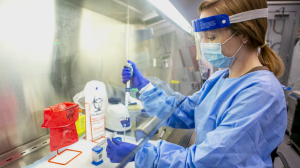Duke Health Fund Fuels COVID-19 Research
When COVID-19 arrived on American shores and exploded across the country within a matter of weeks, researchers across Duke hastened into action. Duke scientists in fields from microbiology and molecular genetics to pediatrics and surgery are racing to try to understand this exceptionally complex virus and develop approaches to defeat it.
At the same time, the swiftness and severity of the pandemic has strained many of the usual mechanisms by which biomedical research is funded. Acquiring dollars for research, personnel, and equipment from federal funding sources, industry, or even within institutions is often a laborious and time-consuming process, poorly suited to unforeseen and rapidly arising needs such as those presented by COVID-19.
Fortunately, Duke has been able to meet some pressing needs to carry on the fight thanks to the foresight of Duke Health leaders who established a special fund more than a decade ago and to the generosity of many dedicated donors who have supported it ever since.
The Duke Health Fund provides a pool of resources that can be tapped for whatever needs are deemed essential by Duke Health leaders.
“Thanks to the Duke Health Fund, we have been able to provide some of our scientists with the resources they need to fill critical gaps and continue their research without breaking stride,” says A. Eugene Washington, chancellor for health affairs and president and CEO of Duke University Health System. “The Duke Health Fund gives us the flexibility to meet the most unforeseen and urgent needs. COVID-19 certainly meets that definition, and we are grateful to those donors who have helped give us the tools we need to wage this battle.”
Administrators and development leaders created the fund in order to provide leadership with a source of flexible, unrestricted funds.
Over the years, grateful patients, families, and many first-time donors have contributed to the Duke Health Fund, helping it grow to nearly $550,000 by the time COVID-19 appeared.
By the standards of biomedical research, especially during the current pandemic, that’s a modest sum. But the Duke Health Fund has played an important role in enabling Duke to move very quickly to fill some immediate, critical needs that advance research on the coronavirus.
The School of Medicine drew on the Duke Health Fund to create the Duke COVID-19 Clinical Research Task Force, under the leadership of infectious disease specialist Susanna Naggie, MD, vice dean for clinical research.
The task force coordinates research protocols for clinical studies involving patients with COVID-19, including a study across Duke Health to explore the effectiveness of a variety of therapeutic treatment options. The Duke Health Fund is providing resources for personnel including clinical research coordinators and a biostatistician, as well as personal protective equipment and other necessary laboratory equipment.
Another allocation from the Duke Health Fund enabled Thomas Denny, MSc, M.Phil., to launch a pilot project that analyzes de-identified blood samples from patients admitted to the emergency room at Duke University Hospital to determine whether they carry antibodies that indicate COVID-19 exposure.
Denny’s initial analysis, called a seroprevalence test, indicated that COVID-19 was present in the Durham community before the first positive tests were announced in March. That test opens the door to further study and, Denny hopes, will leverage additional federal funding to support more advanced research.
“This pilot funding is critical in helping us start to understand the extent of virus penetration in our region,” says Denny, the chief operating officer for the Duke Human Vaccine Institute. “Now we want to carry that forward and do more targeted and in-depth analysis. We want to understand how many people are developing antibody responses, and we want to validate that an antibody response confers protection against re-infection. This project gets us started in the right direction.”
The Duke Health Fund has also provided Greg Sempowski, PhD, who oversees Duke’s Regional Biocontainment Laboratory (RBL), with the resources to purchase incubators, centrifuges, and other equipment to fully maximize the RBL’s capacity and expand Duke’s COVID-19 research efforts.
The additional laboratory equipment allows more Duke scientists to conduct research at the RBL. That research is being done by experts in a range of disciplines and has three primary aims: to rapidly develop therapeutic countermeasures to mitigate the effects of COVID-19 infection; to rapidly develop vaccines to confer protection against infection; and to better understand how the virus is so easily transmitted and produces such disparate clinical symptoms and outcomes.
The Duke Health Fund highlights the importance of philanthropic support that gives academic medical institutions resources that can be used rapidly and without restrictions, says Sempowski.
“It is unbelievably helpful that we had access to unrestricted funds that allowed us to quickly purchase the equipment to fully outfit the containment lab,” he says. “COVID-19 poses a lot of questions, and these funds gave us the flexibility to get more faculty in here doing the research to answer those questions.”
"The Duke Health Fund gives us the flexibility to meet the most unforeseen and urgent needs. COVID-19 certainly meets that definition, and we are grateful to those donors who have helped give us the tools we need to wage this battle."
A. Eugene Washington, MD, MPH, MSc Chancellor for Health Affairs and President and CEO of Duke University Health System





